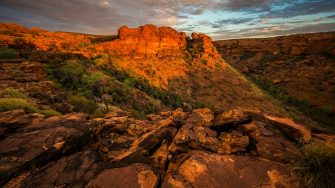
Overview
The UNSW Investigating Earth and Its Evolution (GEOS1111) course provides a sound basis in Geology to those wishing to pursue professional careers as geologists, geoscientists, mining and petroleum engineers, and environmental scientists. It will be of interest to those who wish to understand more about the nature and origin of the Earth and its evolution; plate tectonics, the formation of rocks and minerals, geological processes, and life through time. The fundamental properties of minerals and rocks and the processes by which they form are described. Methods for the analysis, description and definition of geological materials, fossils and resources are provided. The importance and role of geologists for the development of sustainable societies, sourcing materials for modern technologies and economic growth, while maintaining healthy ecosystems is discussed.
"It was soon after I began collecting stones, i.e., when 9 or 10, that I distinctly recollect the desire I had of being able to know something about every pebble in front of the hall door…”
- Charles Darwin, Geologist and Biologist
During the course, you may seek to answer the following questions:
- What are the main building blocks of the Earth?
- How do mountains, ocean basins and rift valleys form?
- What geological processes have shaped our Earth?
- Where will we find the essential resources to support our ever-changing technologies?
Geology is fundamental to understanding the physical world and answering the endless questions are essential for science, society and all industries.
Course breakdown
Investigating Earth and Its Evolution is a first-year course and is essential for anyone studying an Earth Science major or specialisation. The course aims to introduce you to the fundamental building blocks of our planet – the rocks that define landscapes and mineral exploration methods. It will provide you with fundamental knowledge essential for Earth Science and other geology-related majors.
Investigating Earth and Its Evolution is complementary to the following courses:
It will also prepare you for the following courses:
- Australian Surface Environments and Landforms (GEOS2721)
- Australian Climate and Vegetation (GEOS2711)
- Earth Materials (GEOS2181)
- Earth’s Interconnections (GEOS2291)
- Field Methods and Mapping (GEOS2131)
Investigating Earth and Its Evolution covers the following topics:
- Minerals: atomic structure, bond types, crystal structures, mineral classes and more
- Stratigraphy: definition and uses, principles of original horizontality, later continuity theory of natural selection and more
- Plate tectonics: pre-plate tectonic models, plate tectonic model and plate boundaries
- Geological timescale: early estimates of geological time, relative and absolute time scales, the fossil record, principles of relative and absolute dating (using radioactive isotopes)
- Igneous rocks: processes and description, sequence crystallisation, tectonic setting of igneous activity and more
- Metamorphism and metamorphic rocks: causes and types of metamorphism, reactions and textures, classification and more
- Mapping: nature of the outcrop, characteristic landforms, drainage patterns and more
- Economic geology: economic minerals and ore deposits, economics driving mineral exploration and more
Conditions for enrolment
There are no pre-requisites for this course. However, you may wish to take Environmental Systems, Processes and Issues (GEOS1701) and Evolutionary and Functional Biology (BIOS1101) concurrently with this course.
Career opportunities
This course provides a basis in geology to those wishing to pursue professional careers in Geoscience and Environmental Science. It may also be of interest to those who seek to understand the nature and origin of earth materials.
Relevant roles
- Meteorologist
- Geologist
- Geophysicist
- Hydrologist
- Ecologist
- Environmental scientist
- Mining engineer
- Petroleum engineer
- Earth scientist
- Natural resource Mmanager
- Marine scientist
- Marine biologist
- Environmental scientist
